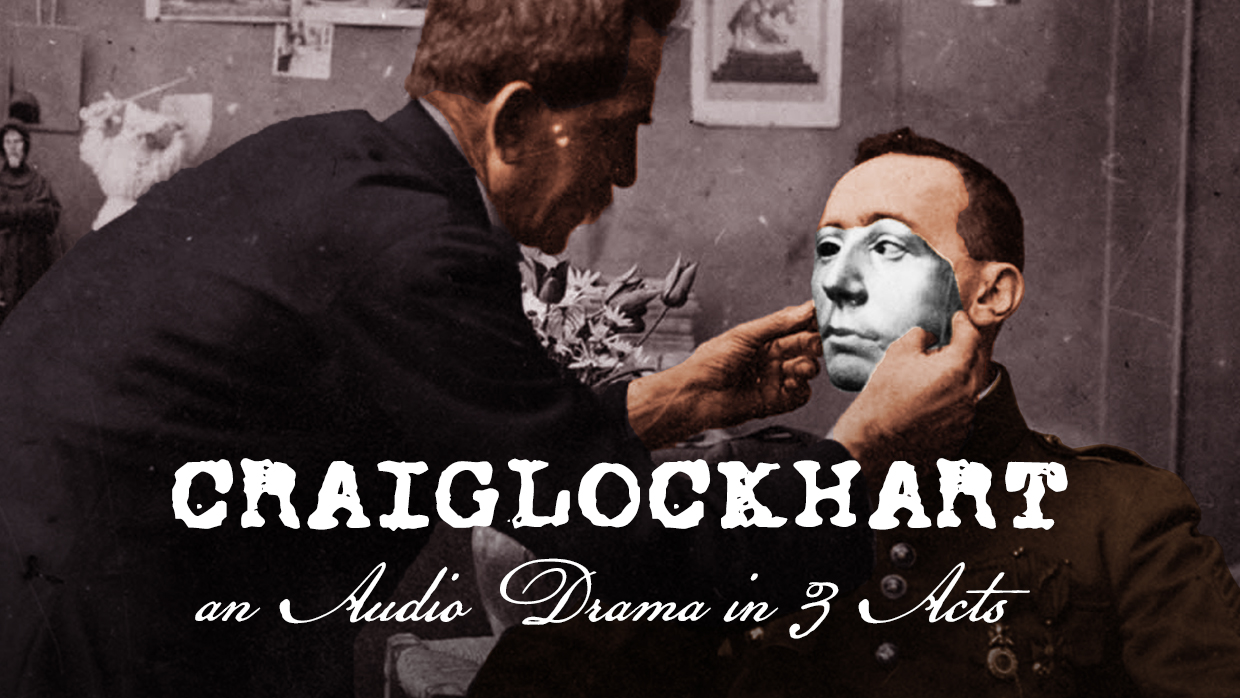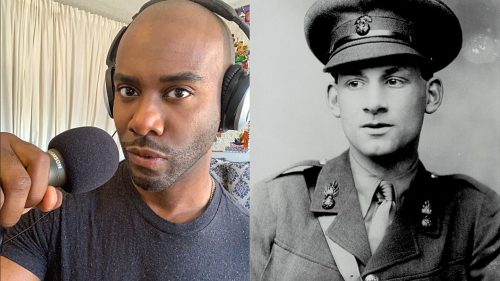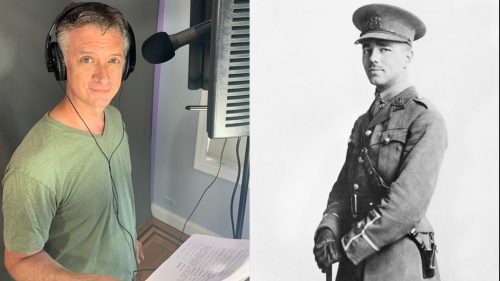 Back to selection
Back to selection
“I Made an Audio Drama Under Quarantine and So Can You!”: Frank Hudec on His Pandemic-Produced Audio Drama, Craiglockhart

There was a meme floating around the interwebs in early April. It consisted of two photos of Donald Glover. On one from, I think, Community, where he is clean cut, smiling and drinking coffee, the caption reads: “New Year’s Day, Looking Forward to 2020!” Next to it was the “Three Months Later” photo; it’s a shot from a Childish Gambino video where he’s shirtless and holding a shotgun.
My January 2020 pretty much mirrored Donald Glover’s sunny optimism. I had just received a contract to direct a long-gestating film of mine, which had been optioned by a French company the summer before. Pre-production and start dates were even set. It looked like I was finally working with serious people and this would be The Sleeping Shepherd’s year. I even had a post-Berlinale meeting with my producers where they outlined how all the financing had been set in place during the European Film Market. We had a few glasses of wine and the subject changed from the film to the Corona Virus then running rampant through Lombardy, Italy. Hospitals were being overwhelmed by the sick, and corpses were stacked up in morgues. I’m pretty traveled, and I know the Italian medical system is first rate — basically Switzerland with better food. So while I should have been worried, I wasn’t. And neither were any of my US producers. We all thought we’d ride this out without any issues.
Flash forward a few weeks and I was locked in my apartment with my wife and dog, staring out the window looking at an endless quarantine. I either drank boxed wine while I scoured the news looking for a clue as to when this might end or drank boxed wine while I watched Criterion Channel all day. Neither was making me feel well. Also, my wife was now working from home and had commandeered the living room, so it was Zoom conference calls all day, every day. I’m sure I was not alone in having 10 or more disembodied voices haunting their home.
But we never know where inspiration will come from, and my wife’s Zoom calls got me thinking about sound and the old adage, “The best film is silent while the best play can be performed on the radio.” If I wasn’t going to be shooting my film anytime soon, then I could at least make a play on the radio! A few theater companies had put on Zoom readings, such as Theatre of War’s production of Sophocles’ Oedipus the King, but personally I found the talking head format took me out of the play rather than into it. Instead, I would use Zoom and record the whole thing remotely, then add music and sound effects to make a radio play. How hard could this possibly be?

I started thinking about what I had already written that could quickly be turned into a radio play or what is now called an “audio drama” and I kept coming back to Craiglockhart. It’s not remotely similar to my other works. In fact, it’s melodramatic as hell. Having watched a six-hour documentary on World War One, I was disturbed yet fascinated by how horrible and pointless it was. Out of that, Craiglockhart was born; a sort of WW1 One Flew Over The Cuckoo’s Nest. It was also an experiment to see if I could write for a limited number of characters in a limited number of places. I re-read it, did a few passes to make it “sound only,” and, surprisingly, it worked. Or at least, I hope it did.
The next step was finding someone foolish enough to partner with me on this quixotic quest. My friend, James Faller, was another filmmaker spending his quarantine trying not to pace a hole in his living room floor. He liked the script and quickly agreed. He would be co-producer, editor and a sort of audio drama assistant director/script supervisor combo, slating takes and keeping the production moving forward.
After that, we needed to find actors. Truthfully, I am a homebody and a misanthrope, so I don’t hang out with that many people and certainly don’t know many actors. But I knew a theater director who knew actors, so I started with him. Gregory Wolfe is the artistic director for the critically acclaimed theatre group Moonwork, which primarily produces Shakespeare using classically-trained actors. And he, like James and myself, was also housebound and going crazy, so became our casting director. I sent him the script and character breakdown and within a few days he was introducing me to actors via email. Next step was setting up Zoom auditions; James would read with the actors allowing me to concentrate on their performances. The first thing I noticed was the video portion needed to be turned off, otherwise watching people read was distracting — especially when trying to evaluate them on their spoken performances alone. We also immediately noticed the strain on the internet from all the people working from home, so both James and I ended up running Ethernet cables through our apartments to keep the signal from dropping out. Otherwise, one or both of us would get pushed off Zoom leaving the actors alone in some sort of netherworld. Another thing we realized is that even with Ethernet cables we couldn’t rely on Zoom for consistent sound, so had the actors record directly to their computers’ QuickTime audio and email the sound files to us later (a future editing nightmare).
Once cast, a podcaster friend of James’ recommended we send highly rated and reasonably priced Samson Q2U USB mics to all the actors. You might think this would be easy; log on to Amazon and make some clicks and everyone gets a mic, right? Wrong. I don’t know but suspect we’ll find out later if there has been a flood of podcasts and audio dramas recently produced, but there was a run on USB mics at the time. And even after having found them after much, much work, the USPS and Fed-Ex were completely overwhelmed with all the people in lockdown ordering things online. It took over a week and a half, but eventually everyone got their mic.

After that, having only known film scheduling, we weren’t sure how to schedule an audio drama, so started out slow. Also, the script was written in play form so there was no accurate film-style page counting. In the end, we found scenes ran another third longer than the page count. Also, with a number of actors juggling kids with their partners, and some with remote day jobs, we would have narrow windows we could record under. The average recording day was four to six hours and we had a total of nine production days for what ultimately came out to be three 30-minute episodes.
To speed things up, we would do rehearsals before we started actual takes. I did have the foresight to record the rehearsals though, which as anyone who’s done any form of production knows, can deliver some gems in post.
We did have a few tech glitches. Sound files from the actors came in all kinds of formats; mp3, .wav, .aiff and on and on, creating not-so-fun sound discrepancies. Also, we had no meters, so we ended up with recording levels that were all over the place. Of course, these are not the kind of things you think about when you have your Eureka moment and think “Hey kids, let’s put on a show!” If you did actually know how much work you had in store, you might prefer to get back to your box wine and Criterion option.
Despite the tech issues, I do think we got excellent performances, especially considering the stress and disembodiment we all experienced doing it remotely and under quarantine. I’ve found out since that many audio dramas record actors individually, but think when using that method you’re losing out on the dynamism that comes from having actors working together even if it’s over the Internet. Sometimes during post, I enjoyed listening to the banter between takes where characters were discussed and the world we were trying to create would be fleshed out, even if that was all back story and the real history behind the fictional characters.
Back to “If I had known what I was getting into…”; post production proved to be a bear. We had no workflow, and neither James nor myself was very knowledgeable about sound editing software. We settled on using GarageBand, since it was simple drag and drop with easy to adjust EQ and plug-ins. Later, we found it lacking when trying to do fine tune edits, and deeper mixing was somewhat counter-intuitive. Regardless, I would listen to the takes and choose readings, which I would send to James to build in GarageBand. Not being able to meet in person meant every decision was very hard to implement; a lot of WeTransfers and phone calls. It would take days to build any given scene. James took over sound design with occasional notes from me. We wanted the asylum to have a certain “funhouse gone wrong” quality to it, so there would be lots of door slams, moaning, voices and footsteps in the background.
We needed music and James introduced me to his friend Andrei Gravelle. Andrei’s work with their partner in Nanotopia is described as the “Bio-sonification of fungi, and occasional sonification from other non-human biodata.” I would say it is very Brian Eno-like ambient music, of which I am huge fan.
Sound effects would come from free sound effects sites, which could mean days of listening to army drills or street sounds. All in all, a tremendous amount of work for only two people locked in two separate apartments. By the time we were finished with our three episodes, we were both burned out.
Just how do you distribute an audio drama? I asked Jamie Dolan who had produced Day by Day; another audio drama made under quarantine (in fact, it’s stories about life under quarantine.) He suggested using Simplecast, which is best described as the audio version of Vimeo. Once uploaded, Simplecast guides you through the steps to post/embed your work on major platforms like Spotify, iHeartRadio, Google Podcasts, and Apple. After that, without major backing from a Gimlet Media or a Luminary, who can get your trailer on your supermarket’s muzak station, it’s not unlike indie film self-distribution where you’re hoping to get a spark from social media and word of mouth. Also, there are podcasts about podcasts and so far Craiglockhart has been highlighted on Audio Drama Debut and on afairexchange, where they interviewed James.
Do’s and Don’ts. I don’t recommend recording over Zoom, that is, unless you’re living under quarantine (I now dream about what this would have been like in a studio). Over Zoom, recording levels and room tones are going to be all over the place. It’s not like you can send a sound engineer to your actors’ apartments when no one is allowed on the street. And some actor’s apartments will be boxy, while others will build tents from blankets to block out their kids playing in the background giving their voices a completely different quality. Some actors will be more dynamic in their delivery, meaning highs and lows can be lost depending on their mic placement. And there’s always the pleasure of low-flying aircraft and sirens. Of course, if we had the kind of budget that The Sandman had from the BBC, we could have sent special rigs, expensive mics and sound partitions to each actor, but that wasn’t within our non-existent budget. Do edit on some kind of Cloud platform so everyone is working from the same material and on the same software, whether that be ProTools or Adobe Audition. Otherwise, you will spend a lot of time replicating work. Do work with generous friends and people more talented than yourself. You can always claim it was your idea later.
So, now that Craiglockhart is finished and the summer COVID-19 respite looks to be subsiding, is it back to box wine and Criterion? Yeah, it was for about three days before that became boring again. I like the medium of audio dramas, so started converting my graphic novel Necropolis into one. Though I think that instead of this being a play on the radio, I want to give myself more of a challenge. It will be more like a ’70s concept album combined with a certain Firesign Theater avant-deconstructivism. All of which sounds very intellectual for what will in the end be an audio drama horror story.
